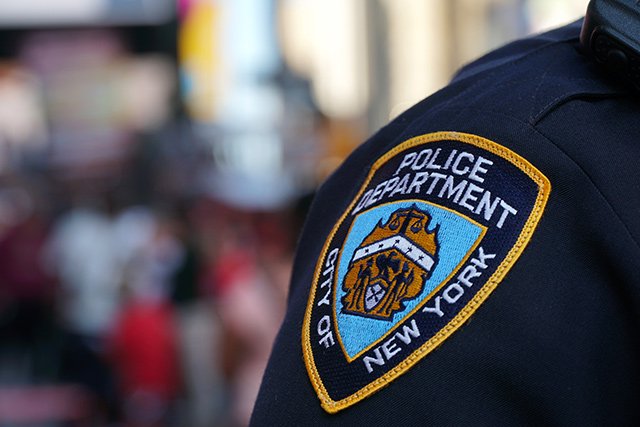Police Officer Kills Himself On Long Island, Marking 4th Police Suicide In June
June 28, 2019, 12:41 p.m.
The officer was a 24-year veteran and assigned to the 50th Precinct in the Bronx.

The NYPD sleeve patch on an officer
A New York City police officer killed himself in his Long Island home this week, making this the fourth NYPD suicide since June 5th. Chief of Department Terence Monahan confirmed the death, saying on Thursday, "We're looking at what we can do as an agency, how we can handle this better, how we can help out people. Cops run out day in and day out and save people's lives that they don't know. We have to figure out a way how to save our own lives."
The officer who died on Wednesday was assigned to the 50th Precinct in the Bronx and had been on the force for 24 years.
The Post and Daily News identified the officer as Kevin Preiss, 53. According to the Post, the officer shot himself in his Hicksville home, where he was pronounced dead. "He was just three days away from his 25th anniversary of joining the force, according to sources... Another cop, who noted how Preiss was soon set to retire, added, 'It’s heartbreaking.'"
A civilian employee at the 50th Precinct told the Post, "He was going to retire next year…And he was always talking about all of the things he was looking forward to doing when he retired. I can’t make sense of it."
Deputy Chief Stephen Silks, just a few days before his forced retirement, was found dead of a self-inflicted gunshot wound in his car in Queens on June 5th. Then, on June 6th, homicide detective Joseph Calebrese died from of a self-inflicted gunshot wound in Plumb Beach. On June 14, officer Michael Caddy was found dead from a self-inflicted gunshot wound in his car near the 120th Precinct.
There were two other NYPD suicides this year, and two weeks ago, Police Commissioner James O'Neill urged officers to seek help, "This cannot be allowed to continue. Cops spend so much of their days assisting others. But before we can help the people we serve, it is imperative that we first help ourselves. There is no shame in seeking assistance from the many resources available, both inside and outside the department. Accepting help is never a sign of weakness — in fact, it’s a sign of great strength. Please, connect yourself or your friends and colleagues to the assistance that is so close by. We must take care of each other. We must address this issue — now — because it will not go away on its own. We must speak out. And we must end this crisis, together."
O'Neill also deemed the situation a "mental health crisis." The NY Times notes the challenges the officers have in seeking help, as much as the NYPD wants them to:
No matter what assurances the Police Department — the “job” in police parlance — makes in overtures to troubled officers, many of them believe that a stigma remains, and that seeking psychological help will lead to a swift change in one’s position.
“The job will tell you they’re here to look out for you, but the No. 1 rule is the job is there to protect the job,” William P. Ryan, a retired detective, said. “You go in there and say you’re depressed or whatever, they modify you. They take your guns.”...
...[T]he hard-shell attitudes of many officers are difficult to change. Karen Solomon, the founder of Blue H.E.L.P., a nonprofit that collects data on police suicides, said she received a disturbing call from a city police officer just days after Mr. O’Neill’s message.
“He said, ‘I was talking to a bunch of guys about this, and they were making fun of the officers and calling them weak and saying that we’re better off without them,’” Ms. Solomon said.
It’s ok to ask your partner, your friend, or colleague, this important question. If you’re asked, it’s ok to answer honestly. We, the uniformed & civilian members of the NYPD, are each other’s & the Dept’s greatest support resource. #StopSuicide #NYPDEAU #ItsOkNotToBeOk pic.twitter.com/Ajv6F1Y6Or
— NYPD EAU (@nypdeau_1085) June 27, 2019
If someone you know exhibits warning signs of suicide: do not leave the person alone; remove any firearms, alcohol, drugs or sharp objects that could be used in a suicide attempt; and call the U.S. National Suicide Prevention Lifeline at 800-273-TALK (8255) or take the person to an emergency room or seek help from a medical or mental health professional.